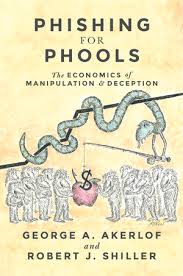The key point of the book is aimed at the mythology of free markets. Simply stated they are an ideal that does not exist. According to the two authors, big corporations take advantage of the ‘stories we tell ourselves’ and of our ‘monkey-on-our-shoulder tastes’. Our propensity to make choices according to multiple cognitive and psychological biases makes us easy targets for the phishermen. If one sentence could epitomise their thesis, it would be Jean-Paul Sartre’s’ famous saying: ‘We are what we make of what people want to turn us into.’
In their new book Phishing for Phools: The Economics of Manipulation & Deception, Nobel Prize winners George A. Akerlof and Robert J. Shiller deliver a timely and much-needed plea against the free market dogma that surprisingly seems to have outlived the financial crisis. According to the two authors, big corporations take advantage of the ‘stories we tell ourselves’ and of our ‘monkey-on-our-shoulder tastes’.
Some of the most recent news, including Volkswagen’s fool’s game of rigging pollution tests, remind us that one should always keep in mind the key insights of Phishing for Phools. Flawed studies sponsored by Big Pharma, money politics, political action committees, Daedalean financial engineering, credit cards (or ‘magic pills’) that encourage us to buy more: numerous are the ways in which one can be phooled. Akerlof and Shiller give a detailed and highly accessible account of the short-sightedness of the free market equilibrium thesis as a putative Pareto optimal situation maximising the economic welfare of everyone.). Phishing for Phools

